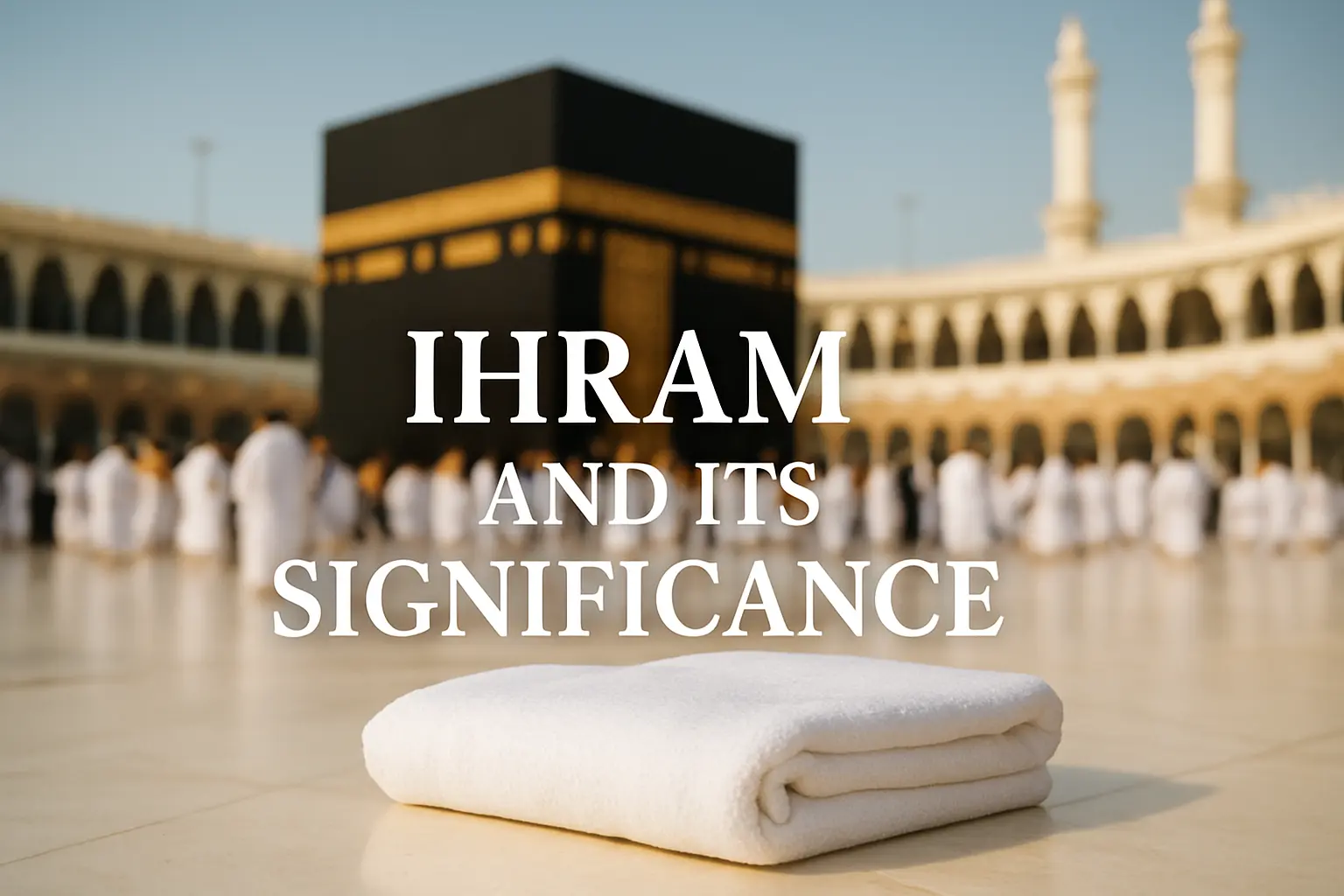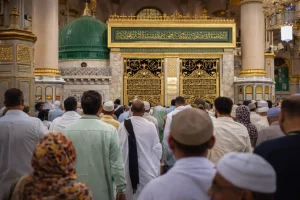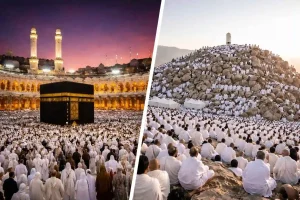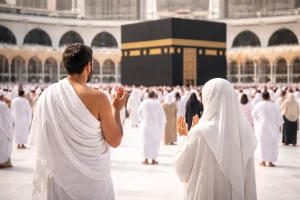If you’re thinking about Umrah or Hajj, there’s one moment that changes everything, the moment you wear the Ihram.
Many people from the UK plan their trip for months, book flights, pack bags, yet the real start is quieter. It begins when you pause, wash away the noise of daily life, and step into Ihram and its significance.
Before you reach Makkah, before Tawaf or prayers, you cross this inner line. The white cloth reminds you: you’re not here for business or sightseeing. You’re here for Allah. The importance of Ihram is that it turns an ordinary traveller into a pilgrim.
What Is Ihram?
The word Ihram comes from Arabic and means “to make sacred.” That word alone tells you so much. Ihram is two things:
- A state of mind and body. You decide that you’ll now live in a sacred way, calm, patient, aware.
- A simple garment. For men, it’s two unstitched white sheets. For women, it’s modest clothing that avoids luxury or perfume.
When someone says, “I’ve assumed Ihram,” it means they’ve stepped into that sacred state. From then on, every word and movement counts as worship. That’s what gives Ihram and its significance such weight in Islam, it’s both visible and invisible devotion.
Why Ihram Matters Spiritually
1. Everyone Becomes Equal
In Ihram, no one can tell who’s rich or poor. The clothes make everyone look alike. It’s a quiet, powerful lesson. When millions stand shoulder to shoulder in the same white fabric, it’s like the world has pressed pause on pride.
This unity is part of the importance of Ihram. You remember that Allah sees hearts, not outfits.
2. It Clears Your Intention
Ihram asks you to leave behind perfume, stitched clothes, and distractions. You come as you are. The simplicity makes room for sincerity.
When your heart isn’t busy showing off, it finally finds space to connect with Allah. That’s the heart of Ihram and its significance; it polishes your intention until it shines.
3. It Marks a Line Between Daily Life and Worship
The Qur’an says:
“Whosoever intends to perform Hajj (by assuming Ihram), let him avoid sin, arguments, and wrongdoing.” (2:197)
That verse is like a gentle rulebook. The moment you wear Ihram, you’ve entered sacred time. You don’t argue, gossip, or lose your temper. You’re no longer rushing through life; you’re slowing down to remember.
4. It Reminds You of Life’s End
Ihram’s white sheets look like the cloth used for burial. That isn’t dark, it’s beautiful. It reminds you that life is short, and all that really stays is faith.
Every time you look down at that plain fabric, you remember to live humbly and walk softly. That awareness is part of Ihram and its significance brings death’s lesson into life.
5. It Teaches Self-Control
Ihram has its rules: no cutting nails, no hair trimming, no perfume, no arguments, no hunting. At first, it seems strict. But those limits are gifts. They help you practice calm and patience, the real tools of worship.
This discipline shows the importance of Ihram as more than ritual; it’s training for the soul.
Ihram in Everyday Life, The UK Pilgrim’s View
Picture yourself leaving London or Manchester. You’ve handled emails, packed snacks for kids, and maybe rushed to catch the flight. Then, just before the Miqat, you change into Ihram. Suddenly, the world feels slower. The noise fades.
That’s how Ihram and its significance work in real life; they pull you out of the rush and into peace.
- A visible promise: The moment you wear it, you silently declare, “I’m in worship now.”
- A mental boundary: Putting it on at the airport or on the plane helps your heart shift gears.
- A pause from luxury: No brands, no perfume, no show. Just prayer and presence.
For UK Muslims used to busy schedules, that simplicity feels freeing. You carry less, worry less, and think more about what truly matters. That’s the importance of Ihram, it turns every minute into devotion.
The Essentials of Ihram
- Intention (Niyyah): You decide why you’re entering Ihram, Umrah or Hajj, and make that intention clear.
- Clothing: Two plain white sheets for men, modest dress for women.
- Miqat: The boundary line where you must be in Ihram before crossing.
- Prohibitions: No cutting nails or hair, no perfume, no fighting or showing anger.
- Duration: You stay in this state until the main rites, Tawaf, Sa‘i, and hair trimming, are done.
A Simple Way To Prepare For Ihram
Getting ready for Ihram is more than packing a bag. It’s preparing your heart. When you understand Ihram and its significance, you’ll notice that every small action, washing, folding, or even choosing where to change, becomes part of worship.
1. Clear Your Schedule
Before you travel, tidy your world. Finish work tasks, tell family you’ll be off the grid, and set your out-of-office email. This helps you step into Ihram without unfinished thoughts tugging at you.
It’s easier to focus when life at home is at peace. That mental space deepens the importance of Ihram because you can now give it your full attention.
2. Clean and Prepare Yourself
Before putting on Ihram, take a full shower (ghusl), trim nails, and wear unscented soap or lotion. These acts are simple, but they signal a new beginning. You’re saying goodbye to ordinary routines and stepping into purity.
That’s the quiet magic of Ihram and its significance, how simple acts turn into spiritual readiness.
3. Pack Light, Think Light
For men: pack the two white sheets, a belt or money pouch, and easy-to-remove sandals.
For women: modest, plain clothes, a headscarf, and comfortable shoes. Avoid scented products, heavy makeup, or flashy items. In Ihram, less really is more. Every gram you remove from your bag feels like a burden lifted from your heart.
4. Choose Where to Assume Ihram
If you’re flying from the UK, you’ll need to enter the state of Ihram before crossing the Miqat. Many travellers change in the airport prayer room or even on the plane before the announcement. Check your airline and group leader’s guidance. What matters most is intention, not location. Once you say the Talbiyah, “Labbayka Allahumma bi-Umrah”, you are in Ihram.
That moment is powerful. The world shrinks, and worship fills the space. That’s the importance of Ihram at its core: an instant transformation from traveller to pilgrim.
5. Set a Simple Goal
Ask yourself: what do I want from this journey? Maybe peace, forgiveness, or gratitude. When you define that quietly before entering Ihram, every step that follows becomes part of that goal.
Many pilgrims write one small dua in their phone notes, something they’ll repeat during the trip. Try it. The clarity anchors your focus and deepens your connection to Ihram and its significance.
Common Myths About Ihram
Even among experienced travellers, confusion creeps in. Let’s clear a few.
“Ihram Is Just the White Cloth.”
No, it’s the state that matters most. You can wear the garment early, but until you make your intention, you haven’t entered Ihram. It’s the heart, not the cloth, that counts.
“Women Must Wear Two White Sheets Too.”
They don’t. Women wear modest, loose clothing that covers properly, but can be any simple colour. What matters is humility, not matching garments.
“You Can Only Assume Ihram in Saudi Arabia.”
Wrong. You must enter the Ihram before crossing the Miqat. For UK travellers, that could be at Heathrow or during the flight. Missing it can mean extra steps or penalties later.
“I’ll Break the Rules by Mistake.”
You might, but don’t panic. The rules guide you toward discipline, not punishment. If you slip, repent and continue. Sincerity outweighs perfection.
Clearing these myths helps pilgrims truly feel Ihram and its significance, rather than treating it as a checklist.
Living the Spirit of Ihram After the Journey
Carry Humility Home
When you wore Ihram, you felt equal beside strangers. Bring that feeling back. Treat people with the same quiet respect you felt in Makkah. That’s how the importance of Ihram lives beyond the trip.
Keep Life Simple
Ihram teaches minimalism, two sheets, one purpose. You can’t stay in that state forever, but you can keep the lesson. Buy less. Speak less. Choose peace over noise.
Make Every Day Intentional
Before Ihram, you made a clear niyyah. Try doing that daily: before work, before meeting others, before making choices. You’ll find that your ordinary days begin to feel sacred, too.
Reconnect Often
When life in the UK gets busy, close your eyes and remember standing in Ihram. Remember the silence, the equality, the stillness. Those moments are reminders that Allah is never far.
This reflection shows the ongoing significance of Ihram; it doesn’t end when the garments come off; it’s meant to shape who you become.
Final Reflection
Ihram is more than fabric and rules. It’s a doorway. When you step through it, you leave behind what doesn’t matter and carry what does: sincerity, equality, and patience.
For UK pilgrims juggling faith and a fast-paced life, Ihram and its significance offer balance. It tells you to pause, reset, and remember why you began.
May your Ihram be pure, your intention honest, and your journey accepted. And when you return home, may that sacred calm stay with you, in the way you work, speak, and walk through this world.
Sources
- Qur’an 2:197 – Guidance on conduct and prohibitions during the state of Ihram.
- Hajj & Umrah Planner – “Ihram: Meaning, Rules, and Significance.”
https://hajjumrahplanner.com/ihram/ - The Pilgrim – “Importance of Ihram During Hajj.”
https://thepilgrim.co/hajj/ihram/ - Quran Reading – “Significance and Rules of Ihram During Hajj.”
https://www.quranreading.com/blog/significance-and-rules-of-ihram-during-hajj/ - IslamOnline – “Restrictions of Ihram.”
https://islamonline.net/en/restrictions-of-ihram-during-hajj/ - IslamQA – “Ruling on Wearing Ordinary Clothing Over the Izaar and Rida (Ihram).”
https://islamqa.info/en/answers/49006 - Britannica – “Ihram (Islamic Rite).”
https://www.britannica.com/topic/ihram-Islamic-rite







